Sid Meier’s Alpha Centauri is commonly accepted as one of the best strategy games ever made. But, almost 15 years since its release there hasn’t been any new sci-fi turn-based 4X game set on a planetary scale. Well, Proxy Studios, a small indie game developer, saw this opportunity, this market gap, and the result was Pandora: First Contact.
Perhaps the first thing veteran 4X gamers will notice about Pandora is how familiar it all feels. The reason for this familiarity is that Pandora looks and plays similar to the Civilization game series, the eternal reference for planetary 4X games. And, that is not a bad thing, but the contrary. Proxy did well in borrowing some of the best stuff from Civilization 4 and Civilization 5, the most glaring things being the hexagon-styled map, the slick and intuitive user interface, the in-game encyclopedia and the military stacks.
Of course, Pandora: First Contact also plays very similar to Sid Meier’s Alpha Centauri, a title the devs say to have been “inspired by” when developing their own 4X game. And, it shows. So, you’ll find a host of borrowed concepts from SMAC in Pandora. The Human venture into a recently discovered Earth-like exoplanet, the different factions with their distinct ideologies, the hostile alien flora and fauna, the planetary terraforming (not as complex but more on that later), the sense of mystery, the exploration of an alien world, the struggle and the conflict. Basically, Pandora uses the same theme and many concepts from SMAC.
And now you may be thinking: “So, but if it plays similar to Civ and SMAC, why should I play Pandora?”.
Where Pandora stands out
I played all Civilization games to death. I also played a lot of SMAC back in the day. And now I play Pandora: First Contact and find it quite distinct and enjoyable in its own way. Why? Because it does many things differently from MicroProse’s and Firaxis’ 4X titles. The most glaring difference is perhaps the way the game’s economy works, in particular how the production system works.
In Pandora, production is not tile-based but job-based. What this means is that each map tile around your city does not generate all the yield shown in the tile but only the amount according to how you assign your workforce. Let me give you an example. Say there’s a map tile around your city that shows 2 food and 1 mineral. That tile will not generate 2 food and 1 mineral if you assign a worker there as it would in Civ games, or in any other typical 4X game. You either assign one population unit to be a miner there, and it will harvest the 1 mineral alone, or to be a farmer, and it will yield only the 2 food per turn. Combined with a global resource pool, Pandora’s job allocation system allows for a natural predisposition for city specialization in a scale I never experienced before. So, it’s common to end up with entire science cities, mining cities, resort high-tax cities, mixed production cities and other combinations, because each city does not need to feed their local population. That’s assured by the empire’s global food supply. So, Pandora’s economy system is unique, and that is definitely one of its stronger aspects.
Another distinct and strong feature, that makes Pandora stand apart from other 4X games, is the tech tree’s random nature. Research paths in Civilization and SMAC, as for almost any other 4X game for that matter, are fixed. And, so, the tech progression feels almost exactly the same in every game. In Pandora, the tech tree’s shape is randomly generated, so the progression feels significantly different in each game, and there’s also no guarantee that all the techs will be present, which is also a very nice twist. Though, this random nature comes with a price, unfortunately. You see, the connections between the techs, the tech requirements, are not very meaningful, if they make any sense at all. You could have researched a new type of farming method that boosts food production and that may lead you to research a… new boat hull next.
This was the price to pay for the randomization process, but I think the devs could have implemented the system a bit better. Many tech paths are plausible enough if you use your imagination a bit, but some don’t make any sense at all. I think they should have devised a way to disallow certain techs to precede others. That wouldn’t be too hard to accomplish, I guess, and immersion would gain with that. But, the tech tree is quite big and I find most of the techs to be quite interesting, especially at the later stages (e.g. Black Holes, Organic Tanks, EMP beams). However, it’s not uncommon to start breakthroughing techs every 2 to 4 turns after some point. So, while there are lots of techs to unlock, you can’t help not to feel that everything is happening a bit too quickly. You can decrease the game pace at game setup though, but that also affects production speed. So, overall tech progression is enjoyable and the tree’s random nature is a very welcome feature which helps achieve more replayability. But, some further balancing would be welcome, and it would be great if the tech progression could make just a little more sense.
Another strong innovation in Pandora is the possibility to use support actions anywhere in the map. These immediate actions, called operations, let you have a more direct and fast interaction with the battlefield. They are actually quite satisfying to use because they increase your options and really make you feel powerful, a very important aspect in 4X games. Examples of such operations include satellite bombardment, nukes, instant repair, satellite scanning and even controlled singularities (black holes). And this is a new thing gentleman. And a big one too. You may have seen this mechanic in other strategy games like Command & Conquer: Generals or Company of Heroes. But, to this date, and if my memory serves me well, I’ve never seen this “operations” feature in a 4X game before. And let me tell you that it works great and it’s a lot of fun to use these. Some operations require that you build a special building to unlock them, and they will get replenished from time to time. Other operations are directly unlockable via research and you can produce as many as you want from that point forward. Operations are one of Pandora’s most important innovations and fun features, and surely one of its stronger points.
One more innovation worth mentioning is the nice automatic migration feature, another rare system to find in 4X games. When your morale is low and you don’t have enough living space in your cities, your people will tend to migrate to more desirable locations. This simple but very nice mechanic helps with immersion, as a sort of feedback to the way you plan your cities. And, it’s also a useful mechanic sometimes when you want to divert population from one city to another, to say, generate more science or food faster in your newly founded and specialized cities. And to achieve that migration effect you just need to improve life conditions on the destination city and not improve them (or even make them worse) in the cities’ you want the migration to come from. The game could just allow you to move people around at will, but I find this simpler and automatic migration system to be much more plausible, fun and micromanagement-friendly.
But, if you’re a fan of Sid Meier’s Alpha Centauri, you may still may be asking yourself (as one person actually already did in this site):” I have SMAC with the expansion pack Alien Crossfire – is Pandora distinct enough from that to warrant the price point?”.
What’s different from Sid Meier’s Alpha Centauri
There’s no question that Pandora is a very similar product to SMAC. So, one may wonder why should they invest their time and money in Pandora? Why not just play SMAC with its expansion pack Alien Crossfire instead?
I played a lot of SMAC in the day, which I consider to be one of the best games I’ve played, but it’s been almost 15 years. So, to refresh my memory I dedicated a portion of this review time to play SMAC and to see how Pandora really stands out against Firaxis’ sci-fi strategy master piece.
The way this will work is that by no means I’ll be thorough in my comparison, as I will not do a review of SMAC here! :) So, I’ll just highlight what I think are the major differences between the two titles, my personal picks to understand what major feature one game does better than the other.
Let’s start with the obvious. Pandora’s graphics are better. Now, this isn’t too unexpected for a game produced 15 years later. But, graphics alone are hardly the point in a game like this. No, seriously, they aren’t the point at all. Graphics can help with immersion, and will certainly help capture the younger generation’s attention more, but above serviceable it’s not going to be the graphics alone the reason why you will prefer to play Pandora, at least not if you’re a veteran 4X gamer anyway. But, the point is made. Pandora’s graphics are nice and much better than SMAC’s overall.
Now, let’s talk about the factions, no doubt one of SMAC’s most memorable aspects. SMAC’s has 7 factions while Pandora offers 6. All Pandora’s ones are almost carbon copies of SMAC’s with different names, lore and other details. So, in essence you have the religious zealot, the militaristic mind, the industrious one, the green sisters, the mogul entrepreneur and the research guy. The only one left was SMAC’s Commissioner Pravin Lal of the Peacekeepers. I think part of Lal’s essence may have passed to the “green” faction. SMAC wins here. But, I think Proxy perceived that this was a winnable area anyway. So, and this is my personal feeling only, I think they decided to fully borrow SMAC’s factions and make a sort of parody to them. Pandora’s factions are not that bad but SMAC wins in this area any day. SMAC’s factions feel more real, are much more immersive (also due to the excellent voice over work, no doubt) and Pandora can only accept to come in second here. Worth of note also is that I think Pandora should have more factions. As it stands now, a huge game may feel a bit too big and too empty for just the six factions alone. So, SMAC clearly wins on the factions department.
Another glaring difference in scope is the terraforming feature. SMAC’s terraforming is much richer than Pandora’s. It’s like it has another complete dimension to it. SMAC not only allows you to have multiple improvements in a single tile, but it also offers an extra layer of exploitation (deeper mining, more energy extraction and even more food production). But, SMAC’s terraforming also offers a sensor facility and above all else allows for terrain leveling that can have a dramatic impact on the terrain’s yield. So, while Pandora does offer terraforming features, they’re still quite simplistic (e.g. you can’t even exploit the sea in any way at the moment). So, this is one area where Proxy has still a lot of work ahead to even think in coming close to SMAC. So, SMAC clearly wins on the terraforming department.
SMAC’s user interface isn’t bad but isn’t great either, at least for today’s standards of improved accessibility. For example, SMAC’s UI shows you the city size and what’s being built there but only in a crude way compared to Pandora. Of course, Pandora benefited from years of UI trial & error design. And Pandora also adopted many best practices from recent Civilization games, which are almost considered standard these days, like the population growth indicator (ETA for population growth) and the building progress indicator (ETA for building to finish). In Pandora, you can also see the garrisoned units standing in each city and also access these units quickly. In SMAC you can’t tell which cities have garrisons on them, what the garrisons strength is or how many they are, at least not in a quick way. These are all small things but they do help a lot in the game’s flow when they are all put together. Then, the way the map is shown in SMAC, the perspective, makes it much harder to differentiate troops sometimes. Also, the menus in Pandora are more accessible overall. In SMAC you can use hotkeys for almost anything but some functions are not so easily accessible, they are sometimes buried one or two levels deep and can be harder to access if you don’t use hotkeys. So, overall Pandora wins on the UI department.
Then there’s one aspect where SMAC really stands out. Social engineering, or government policies. In SMAC you can unlock new types of governments, or policies during the game, and make a series of defining choices about who you are as a faction, which has a profound effect in the game. These are a set of modifiers that change key parameters of the game, including efficiency, morale, growth, research, industry, espionage and others. Pandora has nothing of this. Your faction strengths and weaknesses are fixed in Pandora, they never change throughout the game, while in SMAC there’s an extra layer of faction behavior complexity which turns gameplay much more unpredictable, replayable and ultimately more fun. This is one aspect that I surely miss.
Then there are other aspects which I think are worth mentioning, like the diplomacy which I think is richer in SMAC, or at least feels more authentic and has more flavor than Pandora’s. Negotiations also feel much more immersive in SMAC, like you’re negotiating with real leaders. You can also trade techs in SMAC and coordinate efforts with an ally. Pandora’s diplomacy is Ok but I don’t think it can compete with SMAC’s, or at least not just yet (more on Pandora’s diplomacy later on the review).
There’s also espionage features in SMAC, something Pandora also lacks. And SMAC also has secret projects, equivalent to Civ games’ wonders, which are very production intensive, while Pandora does not.
I tend to prefer Pandora’s flora and fauna to Chiron’s (or just “Planet” in SMAC) though. I think Proxy really did a good job on creating some interesting alien creatures which are really intriguing. Some of them are even quite powerful, so, you’ll not want to mess with them too soon. Still on the alien fauna, I think Proxy did a good job on creating such a diverse variety of creatures. Some are airborne, others inhabit the seas while others roam across the land, and some of them are quite beautiful and formidable.
In conclusion, and to close this already long SMAC vs Pandora section, I think SMAC is perhaps a more immersive game overall. The atmosphere and the story are richer. The factions, the way they behave through diplomacy, the voice overs, the more alienesque map nature, all these elements contribute to perhaps a more intense and memorable experience. But, SMAC is a much less accessible game and it’s definitely a more demanding, complex and time-consuming experience. So, at the end of the day, and depending on your mood, you may be more inclined to play the quicker, easier to play and more fluid experience of Pandora, perhaps. You may also fancy its tech tree’s random nature more, the global production model where you tend to specialize your cities more or you may enjoy to play with the fun support actions/operations that SMAC lacks.
But, if you’re a SMAC fan and are still undecided if this is the right game for you or not, hopefully the next chapters will help clarify that for you.
Pandora’s Gameplay (cont.)
I already talked a good deal about the factions, UI and how the research and production work in Pandora. So, now I’ll concentrate on the other gameplay aspects, like exploration, expansion & exploitation, diplomacy, the unit design system and warfare.
Exploring the map is perhaps one of the most interesting aspects of a 4X game, and Pandora does a fair job in this department. The sense of mystery when you explore and reveal territory, and first meet each of the different alien species, is quite absorbing. There are also ruins spread across the map in both land and sea. You can investigate these ruins, and contrary to SMAC, where sometimes the outcome is negative (many times in fact), in Pandora the outcome is always positive. Sometimes you’re given minerals, other times a stack of food, experience for your troops or perhaps some tech points. I wouldn’t mind an occasional negative outcome to spice things up, but overall I’m ok with the ruins discovery process. There are many of these spread across the map, so the exploration will not end completely until quite late in the game.
As I said above, Pandora’s aliens (the indigenous fauna) are quite interesting. You can set their aggression level at game setup by the way, which includes a random setting, so you’ll never known exactly when the aliens will become hostile. They’re not in the beginning. And, quite interesting also is the fact that the aliens react to your actions. If you’re closer to a hive, where the aliens breed, you’ll be attacked more. Or at least more often. And, if you destroy one of such hives the loot will be quite nice but you better prepare for a swift retaliation. The aliens also seem to stay away from well defended cities and will refrain from attacking much stronger units. So, the NPC’s AI feels quite right. There’s also a tech that lets you capture these creatures. Then there’s the flora, which is used in the game mainly as special resources found in the map that can boost food or production. But, the most interesting aspect of the flora is perhaps the “fungus”, which is helpful for the alien ecosystem, including the fauna, but toxic to Humans. Later on, this “fungus” can be exploited.
Expansion and exploitation in Pandora is about securing the most “special” resources you can find in the most reasonable way possible, since you’ll not dare venturing too much into the wild in the beginning, at least not until you have a better understanding of how to deal with the aliens that is, as some of them are quite powerful and can turn hostile any time soon. Special tiles found across the map will boost your mineral production, food yield, research, morale and credits generation. And, as the harvested resources accumulate in the global empire stockpile, you can, and will certainly want, to specialize your cities. So, you’ll want to found your cities next to these special tiles. Combined with technology that unlocks resource-boosting buildings it’s sometimes possible to have a single city feeding the entire empire, while you do all your research in another city and let the more production-heavy city build your units for you, usually the capital. Then there’s the morale, habitat, pollution, taxes and growth concepts to manage. You’ll want to maximize growth and morale for increased productivity and tax generation, and to achieve that you’ll want to minimize your pollution, keep the habitat high and the tax rate just right. It’s quite an elegant and micromanagement-friendly economy model that will surely keep you busy trying to figure out how to maximize your production.
Now, let’s talk about diplomacy. I have mixed feelings about Pandora’s diplomacy. I find the current system to be serviceable, but more should definitely be done to enrich it, and many aspects are perhaps a bit too predictable at the moment while others are perhaps too erratic. For example, the diplomacy praise/denounce system allows you to quickly gain/lose favor with an AI. This has the effect that all your friends will be friendlier to the AIs you praise while your rivals will hate them more. However, it’s not uncommon to find yourself locked in a situation of perpetual friendship where everyone praises each other over and over again, and everybody has non-aggression pacts and is happily cooperating with research and trading pacts. And, in these situations, unless you do anything about it, there’s a high chance that all the AIs will just keep cooperating and will try to keep their standings with each other, which is quite of a dull situation to be found in. On other occasions, relations can go sour very quickly and this escalates to a state of perpetual war (or at least very hostile relations). So, the totally opposite effect, but it still feels like you’re stuck on a locked situation again.
My theory for this predictable behavior is that I think the diplomacy system may be a bit too one-dimensional right now, relying too much on military power to decide when to go sour or nicer towards another player. And then the general diplomatic status will typically go either the all friends way or the all out war way. Each faction has its own personality, and you do feel that quite easily as some tend be more friendly while others are more trigger happy. But, more than once I noticed that as soon as my military standing drops, and I mean as fast as in a few turns elapsed, you will start to get tribute demands, non-aggression pacts cancelled and even declarations of war quite fast, even from your long time friends. But, if you start to create military units and manage to be on par with everyone else, or even have the military lead, usually nobody will bother you, and they’ll even flatter you constantly and give you repeated gifts. To fix this predictable diplomacy effect, Pandora should have a social engineering or political system of some kind, like the one found in SMAC for example. The nice thing about these dynamic political systems, like Civilization 5: Brave New World’s World Congress or SMAC’s Social Engineering system, is that the factions’ status quo is shacken at mid or late-game due to important decisions made which tend to break long-time friendships or approach factions who hated each other till then. I sincerely hope the devs plan on implementing some kind of governments, social policies or a council system in patches or in expansions, because right now, diplomacy is a bit too predictable and dull.
But, on a brighter side, diplomacy is quite dependable, so you can really tell who your friends are. Non-aggression pacts will not allow factions to attack each other until one of them cancels the pact and waits for 5 turns before being able to declare war. Trade and research pacts are quite straightforward and are fun ways to foment cooperation, trust or even nice instruments to “smuggle arms” and cash to an AI that you don’t wish to fall into enemy’s hands. A few more diplomatic options would be desirable though, to spice things up, like a warmongering penalty, or at least a penalty if you attack an AI which is friends with another AI. This would stop the more militaristic factions from bullying the others over and over again and perhaps make them think twice before declaring war on a faction that is friendly and cooperating with other factions. The possibility to coordinate efforts with an ally would also be nice. Right now alliances aren’t that useful and will only generate the occasional and fortuitous fight, more due to chance than to a real coalition that defends each other’s interests in case of attack from a third party or that coordinates where the allied factions should strike next.
Warfare is very satisfying in this game though. I mean, really satisfying. There are several types of units available, or hulls, which get upgraded with every new era of discovery, for a total of 3 eras. This means better ships, ATVs (which are kind of quads), infantry, tanks, airplanes and mechs in each research era, which level up through battle. Each hull comes with a default power, which is attack and defense strength combined (like in Civ5 for example), movement speed, sight range, upkeep cost and production cost. Then, you can use the Workshop, which is the game’s feature that allows you to equip and further customize your units with your armor, weapon and special device of choice. And while the armor just applies a strength multiplier (the bigger and more expensive the better), the weapons are quite diverse in the effect they offer which allows you to refine your troop’s role. For instance, some troops may be perfected to counter biological units while others may be stronger against mechanical units or airborne units. Then, there are even special weapon effects like splash damage (damage by area instead of single unit), useful to counter huge military stacks. And, sniper damage, which inflicts few damage but benefits from no retaliation. The unit’s device slot allows you to refine your troop’s role even further. Some devices are your usual +25% offense/+25% defense run-of-the-mill modifiers but others are actually quite cool allowing you to deny enemy retaliation completely, move more, have extra sight, a better healing effect or even capture aliens.
So, if you have nothing against military stacks, and each unit attacking in sequence always against the best defender of the defending pack (ala Civ4), then you’re up for a treat. I loved the system in Civ4 and I’m finding it very enjoyable in Pandora as well. You may say that the game may suffer from the “Stack of Doom” effect, enormous and unstoppable stacks of units sweeping the map. But, I didn’t feel that here at all, even in prolonged wars involving dozens of units in both the attacking and defending side. The splash effect helps counter entrenched cities or big stacks, and satellite bombardments and nuclear missiles will help you soften stacks to the point that you and the AIs should think twice before deciding to put all the eggs in one basket. Speaking of nukes, I never played a game where they felt so well done as in this game. Deciding to attack a strong AI is nerve wrecking, especially when you suspect (or know) that they may have nukes, satellite bombardment operations and possibly even controlled singularity weapons. Preparing for war really gets you pumped in this game, and you’re actually required to think when devising your war strategies in this game. In this respect this is clearly much more of a war game than other 4X games like Civilization or SMAC.
On the AI
Assessing a game AI’s strength is usually a though nut to crack, but after 8 games with different difficulty settings, and map sizes, I think I’m finally ready for an assessment.
With respect to warfare, I think the AI is quite challenging. Even very challenging at times. The game has 5 difficulty settings. I played all my games on Hard and Very Hard, the top two difficulty levels (by the way, the devs say that the AI isn’t smarter in the higher difficulty levels, they just receive morale bonuses, meaning more production overall, starting on the third difficulty level). I won 3 of my 8 games. A military victory with the Imperium, the “militaristic” faction, and two science victories, one with Terra Salvum (the “green” faction) and another with Togra University (the “research” faction). All my victories where on Hard. I lost my two Very Hard attempts, with quick military defeats. So, militarily-wise the AI is quite good. They bring good numbers, attack in more than one front and are usually quite competent with the troops they bring, except a few times where they tend to spam low-ranked troop units all over the place. But, usually, the AI does bring a good mix of units with different specializations (anti-tank, anti-infantry, anti-air, etc), and I never experienced any obvious suicidal missions. So, I’m really very impressed.
Concerning diplomacy, and considering the weaknesses outlined above, my impression is that the AI plays the diplomatic game very well. More than once I saw an AI asking for non-aggression pacts when it was suddenly declared war by another faction, so to limit the possible war fronts number. Other times you do feel that the AIs are more open for negotiations when their military strength is crippled and they are at war with another faction. They do sound reasonable most of the times, or at least inside the parameters of what you’d expect them to be, i.e. they’ll be aggressive if they covet your lands and have a stronger military than you and will be benevolent in the opposite scenario. But, it depends on the faction too, because some are definitely more warmongering than others.
Economically and regarding victory seeking I also think the AI plays quite well. When I conquer their cities they are usually well developed. I also noticed that they use terraforming quite effectively, as I usually don’t feel the need to change or improve what they did. The more peaceful factions tend to go after a research or economic victory more, while the more warlike ones will not lose a chance to prey on their weaker neighbors and will usually go for a military victory. But, the AIs adapt. In one of my games, where I was aiming for an economic victory, where you need to amass a huge amount of credits to buyout the other faction’s economies, I lost to the militaristic faction with a science defeat.
So, in conclusion, I think the AI in this game is quite good and will give you a nice challenge, especially if you go with the higher difficulty levels where the AIs receive morale bonuses which allows them to grow faster than the Human player in all aspects allowing them to produce more units. I beat the game three times but I also lost other three, in Hard. And, I didn’t manage to survive much time in my two Very Hard attempts.
A few more observations and some suggestions for improvement
The game is very stable and performance is very good. The load time, game initialization and turn time are very fast. Late game turns in a huge game can last only up to 3-4 seconds. The devs achieved this by letting the AI battle animations happen while you play your turn. However, there’s some kind of queuing system set for these actions, so, you can’t interfere with the on-going battles, and if you decide to take part in them you must get in line first.
Too bad that the alien threat tends to completely disappear around mid-game. It would be cool to have some sort of alien resurgence in late game or witness the return of the ancient civilization hinted by the mysterious ruins. Perhaps in an expansion pack.
Music overall is good (eight new tracks were introduced after I played the game for this review by the way). The music tracks skip sometimes though. Audio is appropriate. Nothing outstanding but it’s not bad either. Some effects, like laser beams and explosions are quite nice.
The game offers multiplayer via direct connection or through a lobby for which you need to register an account on Slitherine first. I only saw one game hosted on the lobby once. I tried to connect but could not. Well, in theory you can play against 5 friends but I didn’t try it, so I can’t pronounce about multiplayer.
The manual is essentially composed of lore but I found that the game is easy to learn just by playing it. The in-game tutorial events, the encyclopedia and the user-friendly UI will help you getting started. However, this isn’t the same to say that there shouldn’t be a proper manual. It should. Some concepts are not that easy to grasp at first. For example, the diplomacy screen is not very intuitive, so you’ll find it hard to understand who likes who at first, and you’ll probably scratch you head a couple of times trying to figure out what the progress indicators (how good you’re doing against the AIs) actually mean. The combat modifiers and the workshop’s bonuses are also a bit hard to crack, but you should get there through trial and error, eventually. And the hot keys should not be documented in a readme file but be present in a proper manual or in the game itself.
The victory conditions are a bit bland at the moment. There’s a military victory (75% of population), a science victory (75% of all techs points) and the economy victory (enough money to buy the other factions’ economies). The economy victory condition isn’t clear though and it should be better explained in the documentation. There’s no diplomatic victory. So, there’s much room for improvement in what the victory conditions are concerned. I suggest that the devs consider implementing a customizable victory condition where the player could tweak the victory parameters, or even special victory conditions for each faction. Now that would be a very interesting thing to have, in my opinion.
You can rename many things in the game including the city name, the new unit designs but also all the individual troops, an essential but many times neglected feature that allows the player to create his own story.
There’s no hall of fame in the game. Another missed opportunity. The player wants to see its past victories and defeats. The hall of fame is a simple and nice way to keep record of the player’s progress. It’s a small but important feature to allow the players to feel that their experiences, their game stories, meant something.
The different factions have no specific buildings, units or operations. Another missed opportunity but possible to accomplish via an expansion.
Verdict
Pandora: First Contact was a very nice surprise. When I first tried it, roughly one year ago, I had hopes that it could become an enjoyable 4X title, but not to the extent that I found it to be now, at release. In other words, this is a much better game than I first expected and surely one of the games I’ve enjoyed playing the most in recent years. The version used for this review was v1.0.2, by the way.
Playing Pandora feels like experiencing some of the best features other 4X games and great strategy games before it had to offer combined into a single game, sprinkled with a few nice innovations. Borrowed aspects I can identify include the military stacks concept from Civ4, the hexagon shaped map style of Civ5, SMAC’s unit customization system (the workshop), the operations from Command & Conquer: Generals or Company of Heroes and a job allocation production system ala Master of Orion 2 (moving population around between science, production and food). Add to that a rare random tech tree and a very satisfying war experience and you get yourself quite a unique game that is both very replayable and fun.
I highly recommend this game to all fans of 4X games in general as I think this game is a safe bet to experience something fresh but that feels quite familiar at the same time, and I’m sure you’ll get much from this game, like I did. If you’re a Sid Meier’s Alpha Centauri fanatic I think it can go both ways for you though. If you loved SMAC in the day but are now looking for something fresh and more accessible, perhaps not as complex and immersive but much more fluid and war-like, then Pandora is the right game for you to try. On the other hand, if you’re looking for an experience similar to SMAC in what complexity and immersion are concerned, then there’s a good chance that you’ll still prefer to play SMAC. However, I suspect that you still have a good chance to enjoy this game since it offers an interesting new take on the alien planet exploration theme that you love so much.
If you’re new to 4X games I think Pandora is a relatively safe game to enter the genre if you’re curious and willing to give 4X games a try, because it’s an attractive and easy game to enter that should allow you to experience the famous “just one more turn” feeling that you may have heard about 4X games. Also, I think this is a much easier game to get into than other 4X games like Civilization 5, and certainly an easier one to pickup than Sid Meier’s Alpha Centauri. So, chances are that if you like strategy games you’ll probably enjoy your time with Pandora.
But, there are some deficiencies to be found here still. Many lacking areas begging for improvement and many opportunities for new content. But, Pandora: First Contact’s foundation is already a very solid one. This game’s polish level is something unusual for a 4X game’s first release, where usually you’ll need at least one expansion pack to turn the game into an enjoyable experience. Now, if only the devs continue improving the game, and from what I’ve been reading so far that appears to be the case (with a nice big patch released in the day this review got published); if they keep improving the game with more content, then there’s no doubt in my mind that Pandora: First Contact may turn into one of the best 4X games ever, and possibly even top Sid Meier’s Alpha Centauri, if that is even possible. But, make no mistake, this is already a great game as it stands right now.
Pandora: First Contact is available for the PC, Mac and Linux on the Matrix Games store and Slitherine store for $29.99/€23.99/£19.99 (plus VAT depending on where you are).
|
Space Sector score:
8.3/10
great
|
|---|
| The Good: – Excellent stability and performance (very low turn-time) – Easy to pick up due to low learning curve and user-friendly UI – Fun and replayable tech progression due to tech tree’s random nature – Good AI that is both competent in managing its cities as challenging in the battlefield – Elegant and micromanagement-friendly economy allows for the specialization of cities – Interesting and diverse fauna and flora provides a nice sense of discovery – Very enjoyable warfare that really makes you think offering diverse customizable units – Support actions/operations are very fun to use (e.g. nukes, sat scans and black holes) |
| The Bad: – Diplomacy is too simple and too predictable – The factions are not innovative or special enough, and are also too few – Gameplay a bit light (e.g. no espionage, social policies and simple terraforming) – Not as immersive as Sid Meier’s Alpha Centauri (similar game from the 90’s) |

79 Comments
Related Articles:
- Pandora: First Contact Beta Preview Video
- Pandora: First Contact is Out Now
- Pandora: First Contact – First Impressions
- Pandora: First Contact Looking for Beta Testers
- Pandora: First Contact End of Spring 2013 – Beta Still Open

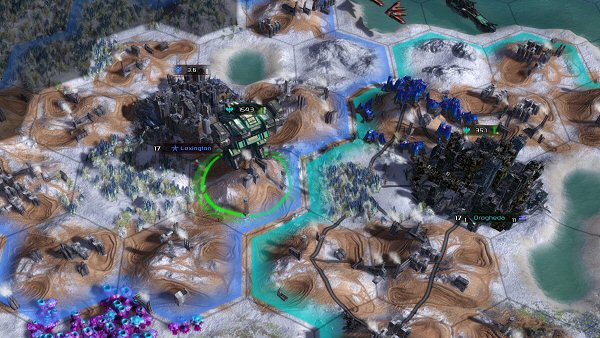
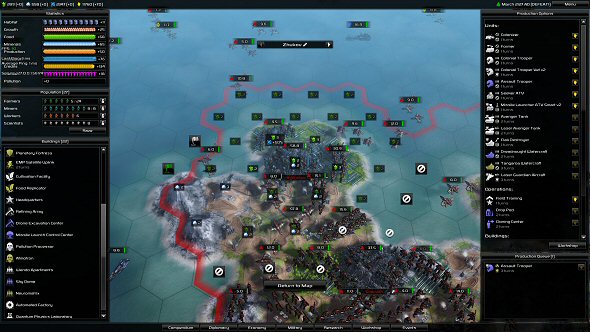
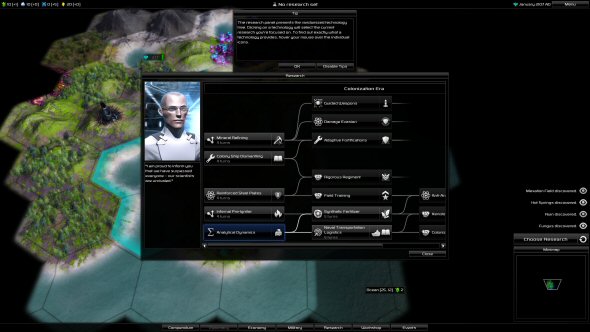
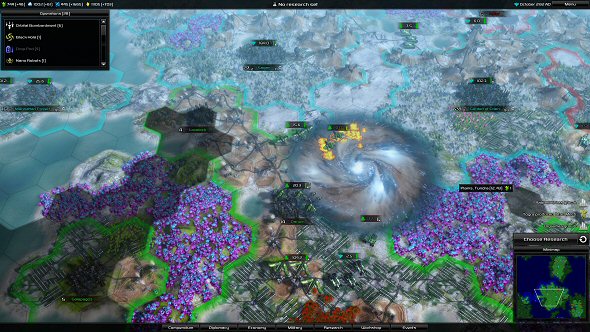
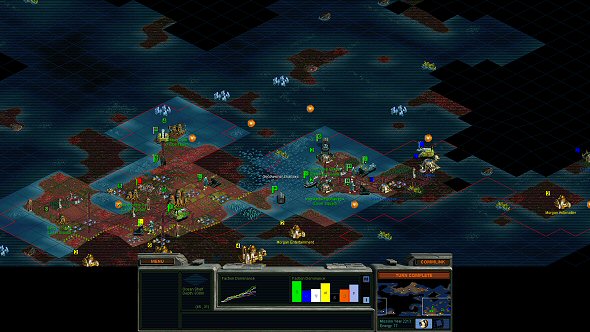
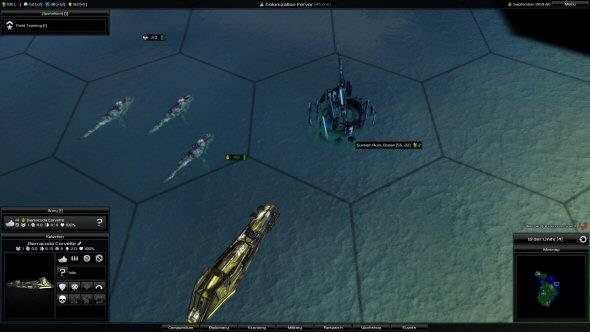
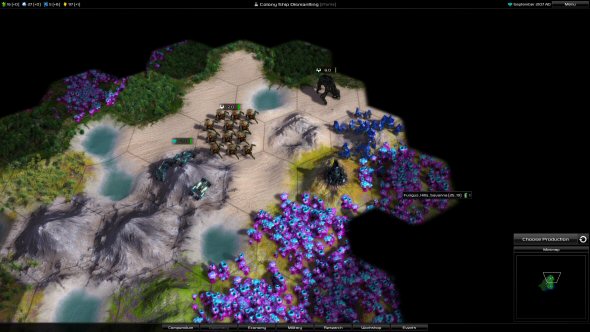
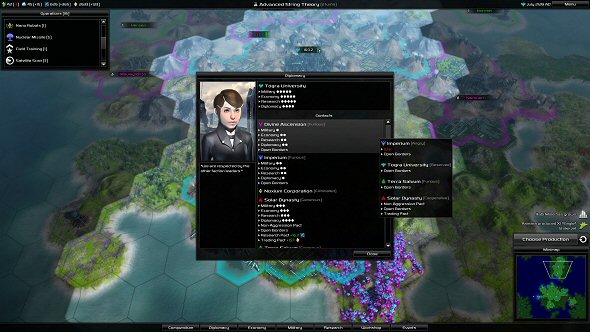
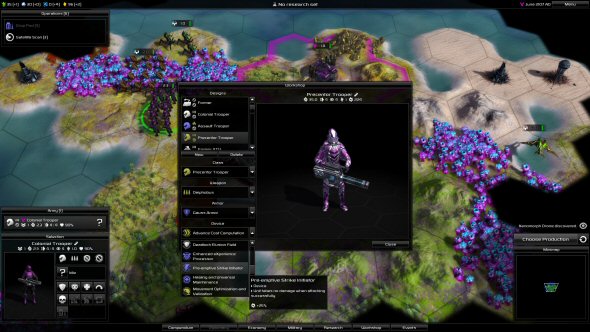
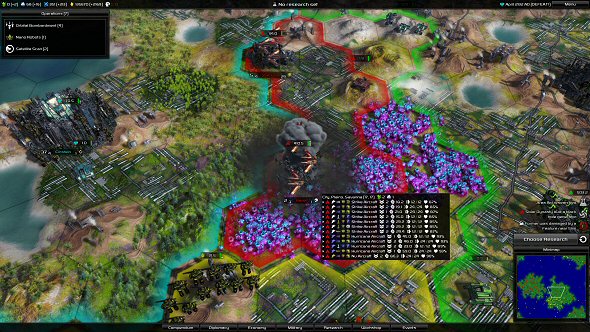
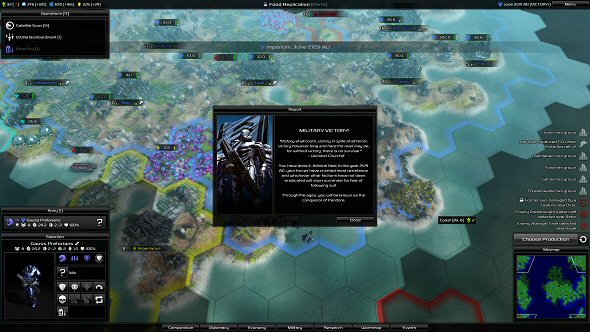

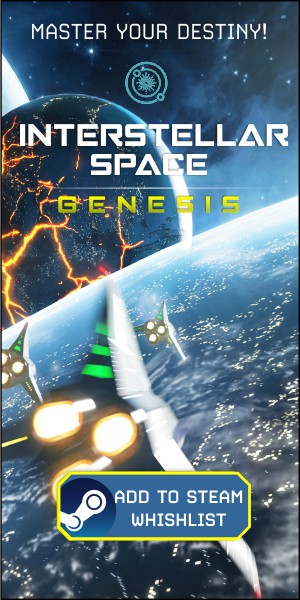





Hi Adam great review as always, I personally feel this has a bit to go yet to dethrone Alpha Centuri but from what I’ve played so far this has great potential to do just that! and if Distant Worlds expansions are anything to go by this will surly be the case.
This game is ok, but nothing special that makes it stick out against other current strategy offerings.
I beta tested but even with the discount offered did not pick it up.
Pretty much the same for me, I Loved SMAC and hoped this would re-ignite my passion for the planetary 4X, and while I enjoyed the Beta, I only fired it up 3 times with play sessions going from about 6 hours the first time, to barely 2 hours by the third.
I will say though, that I attribute my eventual lack of interest in the game more to my own evolution and a change in tastes over the last 15 years.
I feel I prefer the space based 4X game more than the planetary one now, though a *highly* detailed amalgam of the two is where I see the zenith of the genre; something that seems perpetually out of reach since the days of the Imperium Galactica series (I still prefer the first one, is that bad? o_O).
However, the recent spate of space games in the offing is a very pleasant and hopefully continuous development! While most will likely be garbage cash-grabs, attention to this genre may again yield some gems that we’ll be recommending 15 years from now!
Per ardua ad astra!!
Impressive review.
The AI of SMAC was really its strongest point (of all its strong points) so that is a bit of a disappointment. Looks very interesting tough.
Thanks.
Perhaps you missed that part in the review but I feel that Pandora does have a good AI. Military-wise it’s even very good.
Three questions:
1. Does the ending have a sort of “historical playback” feature? I -loved- that in older Civ games, but it seems like most modern 4x games skip it.
2. Related to #1, are there a fair amount of in-game states available? Again, I love being able to compare myself to other players in 4x games.
3. How does culture or territorial ownership work in Pandora? Honestly, I think one of my main issues with SMAC is the lack of any culture system. When combined with the water building and terraforming, I was seeing other factions throwing cities anywhere they could squeeze them, even right in the middle of my empire. I generally prefer Civ 4-style culture over 5, though both are preferable to a total lack thereof.
1. Well, if you mean historical stats, like demographics and graphs at the ending (victory or defeat) it does offer that, yes. If you mean the Civ little movie thing where you see every faction’s progress/expansion through time, no.
2. There are in-game ranking indicators for military, economy, diplomacy and research. The circles you see in the “Pandora: First Contact – Diplomacy screen” screenshot above. You don’t have the nice graphs of SMAC shown during your game but only ranking snapshots at each turn. The game also tells you how close you are on achieving each victory condition.
3. There’s no culture system in Pandora. Factions can only enter in other factions’ territory if they share an open borders agreement. Borders expansion is directly related to the amount of a population you have in each city. You can choose the next tile your borders shall expand to when your city gains a new population.
Thanks for the quick response. Yeah, I guess that’s not a proper culture system, but I was just sort of referring to factional tile ownership (a la Civ 5, only with pop instead of money). I prefer a Civ-4 like system to some extent, though I still prefer any system where player choices can impact ownership over older systems (Civ 1 and 2).
Well you convinced me! Thanks!
thank you for detailed review, are there any gameplay options to make the game more real-time (like sins of solar empire)
i really do not like turn based but is this game fast enough to feel like real time or is there an auto turn time out where i only get 2 min to do my turn, like speed chess?
You can choose “Quick” pace at game setup which accelerates the game’s progression. There’s no timeout for the turns though, at least not in single player.
I was looking forward to this review, despite that I already bought the game. That’s how much I enjoy your writing, Mr. Solo.
I’m flattered :) (Blushes)
No demo. No steam. So, how do I buy this? Do I have to install another client? What’s the DRM? Do I have to setup an account with the publisher? Authenticate once, authenticate every time, authenticate never?
What’s the 411?
No demo. No steam. So, how do I buy this? Are you joking? Surely you jest.
Google – Pandora First Contact
Result – Click First Result
Result – Click Download or Buy Box version
Result – Done
I’m not going to answer the rest unless you have a visa.
The only DRM is a serial key. You don’t have to set up an account with the publisher unless you want to play multiplayer. You don’t need to be online in order to install and play, only to update the game with the latest patch.
I couldn’t agree more with every word. A real gem and I’ll be enjoying it for some time to come.
Erm this review really needs some editing. Its way too long and wordy..say what you want to say and leave out the preamble. I think you conclude the review at least three time then started rambling again. That said I agree with most of this except for your positive opinon of ai diplomacy. The religious and miliarty faction will always evetually attack you and the others are always peacenicks. Not much depth there and the praising mechanic gets annoying.
Regarding the AI diplomacy’s strength, I was not referring to the factions’ styles, if they attack or turtle more or how predictable their behavior is. I was referring to how good they play the “diplomatic game”. I mean, how do they react to situations like being declared war, what they do if they’re at war with more than one faction, or how do they react if they have a weak army, or what’s their posture when they get tribute demands, peace offers and such.
I feel that even the more aggressive factions will be open for negotiations if they’re found in bad spot, so they adapt to the situations. They can be stubborn but they don’t feel brainless or obtuse. That’s what I meant with AI diplomacy.
Nice review Adam, even if a bit long.
Here is some feedback on it:
– Its way too long
Less is often more. I would either cut down on the size of it (seriously: even a quarter of what you wrote would probably be considered an extensive review) by removing needless rambling or add a few paragraphs to sum up the various areas at the beginning then create chapters for each area where I would detail my opinion. Its easier to read that way and people would not be forced to read a novel just to get a sense of what you think of the game.
– You are a little off in what you consider to be strength of a game.
Stability, performance, ease of use, good AI and being fun: these are not strengths. The lack of these can be weaknesses, but come on.. are the standards we expect games to meet really so low that we consider a stable, well performing or usable game to be excellent simply due to “not being horrible”? My standards are way higher than that and I hope yours are too.
Thanks for your feedback and suggestions csebal.
I’ll take the size feedback into consideration as you’re not the only one complaining about that.
On what can be considered a game strength, a good or bad aspect, I see what you mean but we don’t share the same opinion, but that’s perfectly fine csebal.
Now, the way I see it there are many ways you could approach these reviews. I guess some people just want to see the score, others will want a bit more, for which they have the “bad and good” points. Then, you can know my condensed opinion about the game on the Verdict section. The text is divided by sections (perhaps I could have added a few more sections though). If you want to know all the details (the novel part as you called it) you have everything I think and feel about the game for a nice weekend read.
The extra SMAC vs Pandora section also helped enlarge the review a bit this time (it’s the longest review I produced to date).
I like my reviews :) but I do feel that I have a lot to learn still to what editing is concerned. With the eagerness to express myself and to be as fair as possible I tend to perhaps say much more than I should. It’s a learning process.
I really like the long reviews. For the few space titles that we’re lucky to see and have interest in, I love having them dissected in this way. I appreciate and respect the time that went into it. Love this site.
p.s. Can’t WAIT for a Star Lords Preview/Review!!!
Length is not necessarily a problem, structure certainly is. Consider this: everyone values their time, and while they might be interested in your opinion, having to read the entire review to get that might be too much of an investment on their part.
Thus adding a summary at the beginning, broken up into sections just like the rest, but only limited to the synopsis of your opinion in each section would give readers a good overview of what you think. Then if they are especially interested in one aspect or the other, they can just go to that section and read up on the details on why you think the way you do.
It might actually be useful in a review of this length to add links that allow the reader to navigate it quickly. It takes a long time even just to scroll through this one as it is right now, so finding sections by scrolling back and forth can get tedious real fast.
This – sadly – is the price for writing such long winded reviews: extra editorial responsibilities. Its all about overview really and a smart structure that allows readers to quickly “drill down” to the details they are interested in. Plus links.. do not forget the links :P
Hey Adam, don’t listen to those who say the the review was too long! It’s exactly the type of review your frequent visitors want and expect. You covered all the points that interest us fans of this particular genre and I especially enjoyed SMAC comparison.
If you ever run out of ideas on what to write on I would love detailed retro-reviews of SMAC and SEIV with your attention to detail.
I concur, seeing some retro-reviews on this site would be fun.
Thanks for the review. Really good read! Particularly appreciated the SMAC comparison. The speculation on further expansion potential did finally tilt me to a buy it now.
Glad that someone’s tackled the planetary expansion genre, still enjoy SMAC here, but find the age of the UI does put me off a little.
On the length, i prefer a more in depth read, to me it’s a complex game and I like that you went over it in detail.
Thanks again. Merry Christmas! :)
I’d like to give this article a thumbs-up too, great to see a detailed comparison which doesn’t hesitate to pull punches over the weaknesses of either game. My one query is whether the SMAC comparison included the Alien Crossfire expansion (with extra factions, aliens, technology and units). AW adds a good deal to SMAC and since it is now included in the GOG release, should be considered part of the overall experience.
However I would also vote for retro-reviews. The state-of-the-art in strategy games seems to change more slowly than with other genres meaning that old games can still provide a great experience today, especially if they’ve been enhanced with mods (Call to Power II and the Space Empires series being good examples). Maybe run a poll?
I did play Alien Crossfire a bit, mostly to refresh my memories on what it brings new. But, I used SMAC vanilla for most of the comparison work. SMAC is really a masterpiece. It’s incredible how well it stands after 15 years of its release.
Retro-reviews are a good idea. The only reason we don’t do those more is due to lack of resources. If we had more hands checking older games and their mods it would be great, because as you say some of
these older games still hold very well today. Examples from the top of my mind include Master of Orion 1 and 2, Sid Meier’s Alpha Centauri. Star Trek: Birth of the Federation, Imperium Galactica 2, Homeworld 1 and 2 and even Star Wars: Rebellion to some extent. The problem is availability for today’s PCs in some cases.
Of course, you have Ascendancy, Imperium Galactica 2 and Spaceward Ho! on iOS as another possibility to enjoy some of the classics.
Thanks for the confirmation Adam – it was the comparison of alien lifeforms that posed the question since Alien Crossfire does double the number from SMAC (adding spore launchers, fungal towers and sealurks). Plus the two alien factions of course…
Great review.
I disagree about the length to be honest – after reading your reviews I feel like I know exactly how the game plays (with in depth knowledge of the gameplay mechanics), and that’s definitely a good thing when you’re as picky as I am..
I’m definitely going to buy Pandora, but I really hope they do release some expansions to add some extra depth in certain areas.
The developer should read this review – if they add the features and options Adam is suggesting I think it could be the perfect 4x game.
I particularly like the sound of the resource system – where you can focus a city solely on production/science etc without having to worry about food. And the operations system sounds like a great addition for a 4x game.
Thanks again for the detailed review.
I am one of the developers, namely the graphics artist and i read the whole review (not too long at all) and really enjoyed it. We have a lot of plans for the game and we are dedicated to supporting this game for a long time. reviews like this are very useful in guiding us as we try to decide what kind of new content to create in the future.
We are a very small indie studio trying to make fun games that we hope people enjoy playing as much as we do, and i would personally like to thank everyone who bought the game for your support.
Wow, really nice to see a developer reading this and also posting a comment. :-)
I’ve read a lot about Pandora in the past few weeks and it seems your game has had a very positive reception, especially with regards to the fact that it feels polished and ‘release ready’, without any real bugs. That’s a rare thing these days.
As I said earlier – I intend to buy the game, and I’ll be looking forward to seeing where you take it in the future.
Thanks.
I concur, nice to see a developer weighing in. That’s really good to hear that there’s more content and support on the way, maybe we’ll see some improvement in the areas that Mr. Solo mentioned.
I especially hope you guys do something to make the victory conditions more interesting – researching 75% of the tech tree isn’t nearly as flavorful as SMAC’s race to Transcendence. In diplomacy, I found myself missing a “Please end your war with…” option, too.
That said, Pandora is an impressive accomplishment for a small studio. I don’t regret my purchase at all.
Tremendous review; my hat is off to Adam for such a comprehensive and thoughtful piece. This is all the more important because Pandora has no demo (and coming from Matrix, an eventual demo is unlikely) and the game sits in the shadow of one of the “greats.”
I’m not sure I will buy Pandora (too many other games on sale entice me) but at least I’m sure of its quality should I consider purchasing it.
It looks this is a game that would really benefit from an expansion or two. I think I will wait until one is released before checking this game out.
If you like this kind of game it’s good to buy the initial release to support the developers.
The more people buy this now the better the add-on will be (if one happens).
Brilliant. I like a meaty review, so thanks.
Looks very tempting but I am a bit worried with the aspects where SMAC beats it. I am also a bit concerned about how far the devs are going to support this like will we be seeing any expansions or some significant patches or something.
Fantastic review, appreciated the length/depth
Those who complain about this review’s length should note that Mr. Solo did a Pandora “first impressions” piece earlier in November… it was MUCH shorter than this review, but it still contained enough detail to help fence-sitters (such as myself) make an informed decision. In fact, at least one comment mistook the first impressions article for an actual review.
I’m just saying, our illustrious host is letting you have it both ways.
I enjoyed your review. I did not find it too long, but I understand that in today’s “byte-sized” world some people expect to be able to pick up the information they need as quickly as possible, then move and shake on.
Personally, I expect a “Space Sector” review to be long and wordy and detailed; I’m fine with that. I come to this site for that kind of detail.
If I wanted to be really picky there are some parts which could have been worded better (and you’d probably agree – writers are never completely happy with what they’ve written), but I would ask you not to worry too much about your reviews being too detailed. I have just reread your review for a second time, before making this post, and there is very little padding in it.
I realise it’s a balancing act, because you want people to come to your site and not everyone is looking for the same thing. On the other hand, reviews are ten a penny, and I hope you continue to concentrate on differentiating yourself from the “bog-standard” gamespot or pc-ign type review.
Thanks for the support Osito.
Producing thorough in-depth reviews is definitely one of our aims here, and is certainly one of site’s staples. The kind of games we cover are not released every day so I think it makes all the sense to be thorough in our analysis. It’s also a way to make the site unique as you say.
Also, the covered genres allow this long reviews because describing and analyzing the mechanics are not really spoilers as it could be when reviewing more story-driven games like adventure games or RPGs.
Thank you SOTS Prime for showing 4x games RANDOM TECH TREE is far superior to static ones.
Please dont. Mentioning “SOTS Prime tech tree” and “superior” in the same sentence is an offense against the known universe and will probably attract the attention of a similarly well balanced grand menace, so you really do not want to test your luck there.
Excellent game. I’m very much enjoying it. Fun and challenging gameplay, beautifully atmospheric music, and visuals that are very pleasing to the eye. Pandora should be the current poster child of a game produced and marketed the old way. That is, no Steam Early Access or Kickstarter, but rather a product that is polished, stable, and relatively bug-free upon release. Can’t wait to see what Proxy Studios has in store for this little gem in 2014.
I agree and disagree a lot with this review.
First off a confession, i have played the pre-launch version of Pandora up till the release date but have yet to played a “Finished” version of it, so I am quite possibly outdated in my knowledge of the game.
I agree with the mechanical things you pointed out however, for me at least, the mechanics are simply a third of a game, with narrative and spirit being the other two thirds, and SMAC was one of the few games to understand that there is more to a game than just it’s mechanics.
Let me explain how narrative and spirit get into this in relation to a strategy game, since it probably isn’t what you think.
Narrative strangely enough is the harder one to define, since the concept i am referring to isn’t the traditional story idea but the notion of personally history. In experience terms in SMAC i would remember the day Miriam finally broke down and started the third Chiron War, When the university built it’s first sea base, when Yang and I glared down our planet busters at each other. It is a very tangible and intangible thing, for we know it but making it is much harder (And I am still unclear on it). In my play through of Pandora this occurred at the beginning of my first game, but never in any of thesubsequent ones, and i presume this to be caused by my lack of empathy with the factions even though they are similar to SMAC’s, and no i’m not bitter they left out my brother :P, and my apathy to the changing gameplay, after the first tech age nothing really innovates, just improves.
Also, this is just a reflection on how SMAC might have reinforced its narrative feel through the tech lore and the story blurbs it posted every now and then. It seems to be a common theme with games with good narrative sense. HoMnM, KOHAN, MoO2.
Now the spirit while being a much more simpler subject, is probably going to be controversial (if anyone actually reads this). What i mean by spirit is a games Themes through its Thauma, or how we perceive the point of the experience, it is easier to show then to extrapolate. SMAC’s themes were plentiful and while by modern times probably tripe SMAC’s Thauma if nothing else made them interesting, these being the conflicts between the factions.
Deidre’s Sustainable ideals versus Morgan’s Capitalist ones.
Pravin’s individuality versus Shang-Ji’s Communalism.
Pravin’s pacifism and Corazon’s militarism.
And definitely many more, in-fact, i wouldn’t be surprised if there was one for each pairing of the seven.
These themes along with SMAC’s Thauma of a brand new world for humanity to fight for survival on, against the planet and each other, still leaves me with a feeling of hope and depression after several years of not playing the game, and definately back when i played it, if not now, would leave me with interesting questions:
Where does nature end and humanity begin, since Morgan argues it is natural to ravage nature, but Deidre says it is natural to seek balance.
How tolerant should we really be to others, cause if i let people do what they want as long as it is in their territory, the sea level will still go up, but just because i don’t want that doesn’t mean i have the right to stop others doing their things.
Now this is where i am going to try and appease the many people i am sure to have pissed off.
I will freely admit that not all games should worry about having a spirit or even narrative aspects to it, I wouldn’t want to have it in my stress release FPS, Rogue or Strategy games, however to say that we should only mention them if they appear is like saying we should only mention multiplayer if multiplayer is available, it isn’t necessary for a game to be multiplayer but it should be noted it isn’t, but more importantly in Pandora’s case is that its predecessor did, at least it did for me, and in the comparison to not discuss needs to be rectified if desirable by the comparer. I will admit that you (Adam Solo) do mention a fair bit that creates the narrative and spirit, you don’t actually mention it.
Reusing the multiplayer parallel, it would be like saying a game could connect to the internet and can send game data to other peoples computers with little delay, but not saying this enables multiplayer.
I hope that if anyone actually reads this that they gleamed something from the dross, if only the realization of how strange I am.
I think I know what you mean. You’re probably talking about the more difficult things to write about, like soul (what you call spirit perhaps). The way some game’s design allow players to have rich thought experiences (allows them to create their own personal stories), while other games feel barren, dead, soulless, sterile, bland, other adjectives that mean lack of connection between the player and the game.
I guess I may have touched on those topics a few times in the review but maybe not as directly as you suggest. When I talk about “immersion”, “rich atmosphere”, “rich story”, the “more intense and memorable experience” (in the What’s different from Sid Meier’s Alpha Centauri section) I’m talking about that player-game connection.
The bulk of the review is mostly about the mechanics, yes. But, it’s those mechanics, and their quality or lack thereof, combined with the theme, that allow you to personalize many aspects of the game (story, the other element, isn’t particularly strong in this game). So, the workshop mechanic that allows you to customize your troops. The ability to rename things, the possibility to create special cities, the unusual migration mechanism, the interesting fauna and flora I also mentioned. So, I’m inclined to agree with you when you say that the aspects that allow you to have a rich experience may have been touched but I may not have addressed that aspect directly.
Your post really made me think, and I thank you for that.
Well I am glad you two enjoyed it, and sorry for it’s length; I get quite long winded at times.
You’re right that you did mention it tangentially through the mechanics and the mechanics do allow for the games relationship/connection with the player to be much more fluid than the story of theming does, but I wouldn’t say that the mechanics create that connection like i wouldn’t say that paper or other mediums don’t.
Admittedly there wasn’t much outside of mechanics for you to review, I was just going more on just pointing the lack of it out rather than anything else.
(Adam)
I wouldn’t call Pandora Alpha Centauri ‘lite’ since Pandora is more friendly and complicated than SMAC is, except in tech (I miss SMAC’s random tech system (for those unfamiliar you could dedicate your research into a combination of four fields where the majority of your Research would go into, and then the different techs on the hidden trees would be researched, macro friendly and gave a nice arcane feeling to science)), though you are right that Pandora is more than just a good game, it is fairly impressive even without nodding to the fact that it was made by an indie team and i’d doubt me and my group could produce something as polished (especially since our graphics guy has gone awol, again :P) and i could easily see all of my ‘problems’ with the game being rectified in an expansion or two, or even a mod or two if I can get around to it :P.
(John)
Dog, your points are well-taken, and I agree that in its current state Pandora is sort of what you might call Alpha Centauri ‘lite’, but I think you’re maybe being a bit too hard on it. I mean, to have a game from a small Indie developer with this much polished on release is practically unheard of in this day and age. If the game is like it is now, can’t wait to see what it’s going to be like after an expansion or two.
“Beware, you who seek first and final principles, for you are trampling the garden of an angry God and he awaits you just beyond the last theorem.”
Sister Miriam Godwinson ;O)
the workforce thing sounds similar to Colonization. There it was the same that a person could only harvest the resources you assigned them to do (food, sugar, wood…) But overall it looks interesting.
Bought this game based on this review. Looks pretty good, but suffers from the worst thing in ‘Endless Space’ – meaningless run-on sci-fi drivel.
In Civ you research ‘agriculture’ and you can build a farm.
In Pandora the stuff you research stuff sounds like ‘optimized holostatic bi-neuronic polar wave guide research anomoly generator’. Seriously, WTF? Some of the descriptions of things aren’t even sentences.
I love sci-fi gaming but I wish game developers would KISS on this stuff. Adding a ton of B.S. to everything does not make it BETTER.
Well, you can hover icon on the right of the tech name to learn what it actually does.
// I’m liking those names, personally.
Adam great review! Very in-depth. While the game certainly looks very promising thanks to a great start, I think it still needs some polishing and some features added in. Between Civ 5 + expansions, Endless Space Gold and Legendary Heroes, I’m getting my 4X fix for now.
You mention that operations are unlike anything you’ve seen in any 4X game, but I believe they are quite similar to strategic spells in Elemental/Fallen Enchantress/Legendary Heroes. Offensive spells can wipe out entire armies and Curgen’s Volcano can wipe out entire cities. Quite similar, don’t you think? It’s a very fun feature indeed.
Thanks. Regarding operations in other 4X games, ok, it sounds like Fallen Enchantress could have a similar mechanic by what you describe. So, you can use those strategic spells anywhere in the map and not just in battle, right?
Yes, strategic spells are only usable on the strategic map. There are offensive, defensive and summoning spells, and there are also enhancement spells. So you can rain fire on an enemy stack, or immobilize them for 2 turns or raise a volcano where their city stands. With enhancements you can enhance your city to produce more food or gold for 1 mana per turn. And then there are also tactical spells which you can only use in combat, like in Heroes of Might and Magic for example.
I remember you guys reviewed Fallen Enchantress and Legendary Heroes.
Yes, Keith reviewed the Fallen Enchantress games.
Ok, so Fallen Enchantress also has this kind of strategic operations/spells feature :) And they’re really neat to use, aren’t they? It’s probably the sense of power, like you can use them where you want when you want type of thing, and they’re really powerful. I really like them in this game.
As Adam mentioned, I reviewed Fallen Enchantress and Legendary Heroes.
I’ve been a huge fan of strategic spells/operations ever since the Master of Magic days. If done properly, they can make a really significant difference. I’m very happy to see this feature in a sci-fi 4x game.
In Legendary Heroes, I typically found the enemy had too many cities by the point in the game that I had spells as powerful as the volcano for it to really be effective. It’s great fun still, but I didn’t feel like it was significant that late in the game. I also don’t recall the AI using them against me in LH.
i dont like the game so far, only playing 2 games its probally a bit to early to judge but still. both games went pretty much the exact same way, with 2 different factions, and yet it was both times the same. i couldnt get out of my starting location only being able to build 3 cities pretty quickly before 1 or 2 factiosn declared war on me and swarm me with units that just keep me boxed in, im only on the defencive and i cant move to an offence. and the problem that this has happend in both cases so early in the game makes 2 of the 4 Xs kinda moot, the explore and expand part. maybe i had just bad luck, still not a good start.
also i pretty much dislike every faction, if i like the hippie faction the most of all of them i really have to say that something is wrong, this is one of those games where i wish there was faction creator.
so far i can say it wasnt a good expierience, almost feels like star ruler that also got a superb score on this site.
How was your military strength when the AI declared war? Did you produce at least a few military units in your games? As I said in the review, the AI is quite aggressive and will attack as soon as they see the chance (when you have a low military strength), especially the more militaristic ones.
Also, what was your game setup? In particular, what was your alien aggression and AI difficulty settings? Hard AI with low alien aggression is a dangerous combo as the AI’s will not have the alien threat to stop them and they’ll get powerful very quickly.
PS: On Star Ruler, you’ll find two reviews for that game in this site. One is 6.0/10 (initial release) and the other is 8.3/10 (v1.1 – “Gold” version). Which version did you play?
yeah even the peaceloving hippies go on a attack spree as soon as something doesnt go their way.
anyway, i didnt check my military score, it probally was low since i only had 3 cities in both games and only a few defending a some other few exploring, wich came to halt pretty quick. i mean i can hold out for quite some time, for years actually beating everything that comes my way, but in the time i defend my ground the other are getting stronger and stronger and sending waves after waves after waves wich even after i get really good units and techs just crush me. its just like im totally occupied with defedning and bulding new units and healing those that were hurt in the last round wich mostly are quite a lot. i cant even go on expanding my cities all that much anymore because of need of units. maybe i was just unlucky.
my settings were all on normal/medium, wich is the way i play all games pretty much and most certantly my 4x games. the ai is just to agressive for its own good and to me it just seems like the game is more a wargame then anything else, wich is quite sad. also there is nothing for me to go back really, most of the factions are pretty boring and uninteresting, there are no events that makes you go back to explore more of those, the aliens are only a annoyence but dont add anything to the game besides that. the games just leaves me empty.
and dont even get me started on star ruler, its a bad game that should’ve never gotten that high a score, and i did buy star ruler because of that. regreted it deeply. its ai is bad, the diplomacy isnt existing, nothing is explained(i had planets being dead for no reason, they only had a few hundred thousand people left and i couldnt do anything about it, also those planets werent mine anymore either, even though there were still people living there, and nothing explained why it happend), and yes it was the “gold” version, whatever is supposed to be gold about it. as a tech demo, what one guy can do, pretty impressive, as an actual game, that also was left in its sorry state, its pretty damn horrible.
I did find Star Ruler to be a mediocre game on release, therefore the 6.0 score. But, when I played the “gold” version (>v1.1) I did have fun with it and really thought it had enough appeal to warrant a good score, particularly if you’re a fan of the genre. The game wasn’t very easy to get into, and I remember that the tutorial was really mandatory. But, it didn’t click for you in any way I see.
In Pandora I think you may have suffered from the same pattern in both games. Your army was probably too small in the beginning and the aggressive AIs went after you very soon and crippled your military and economy, because you must then concentrate too much energy on producing defenses. And this can be quite a ruthless and unforgiving game if you start badly. And yes, it is much more a wargame than Civ or SMAC (as I said in the review).
I suggest you try a new game in these settings: Large, Continents, Medium AI, Medium/High alien aggression. This should give you enough breathing room to be comfortable and learn how to play. Make sure to get a decent garrison with defense boosting devices. Also, try to unlock the Avenger tank fast. That should give you a good head start. And, make sure to sign some non-aggression pacts, especially with Divine Ascension and Imperium, if possible. They can’t declare war without breaking the pact and wait 5 turns first, so that should give you some time to prepare.
I would be surprised to know that you like to play games like Civ5 and SMAC and don’t find anything in this game to return to. What are your favorite 4X games by the way?
And, are you by any case, or consider yourself, a SMAC fanatic? :)
Warlock: Master of the Arcane has operations (they were called “spells”, though ;)
Hi Adam,
I liked your review, length and all – that’s one reason why I subscribe to SS; for the in-depth reviews. Based on your comments, I went out and bought Pandora and have to confess being disappointed.
I’ve played 3 games (medium difficulty and alien aggression, large size and standard pace). The first game, I lost quickly as I did not expect the ferocity of the initial alien attack. The other two games were won, just by keeping peace with the neighbors and growing while they fought.
I like many things about the game, like the GUI, the graphics, the tech tree and stability.
Things I did not like;
– city spamming is encouraged
– no saving of production queues
– roads can only be built one hex at a time.
– I don’t agree with the logic used by the formers on automatic. Very tedious on manual, I fell asleep more than once.
– unit movement is too slow in the beginning/mid game. At the end of the tech ladders you can get 100% multipliers
– lack of variety in land forms, one game it is all marsh, then another all frost.
– maps are not interesting, just blobs
– very few surprises, no “just one more turn” suspense
– no (tech) trading
– lack of equipment designing possibilities. For example, only one device slot.
– not able to pick number of opponents in set-up
For me, it feels a bit tedious and the fun factor is missing. Although I generally prefer space 4x games, I have to say that Warlord, Master of the Arcane was the surprise (FUN!) hit of 2013.
J
Thanks Jorus, I’m glad you liked the review.
As for your underwhelming feeling, you probably found your experience a bit tedious because you played full-peacefully in both your full games. Pandora is clearly much more of a war game than other 4X games out there, so, you really can’t take all the game can give you without experiencing an occasional war or two.
I’m a builder myself, but I like Pandora’s warfare system so much (even prefer it to Civ5’s) that I’m really ok of not playing full-peacefully (you can always do “just” wars, decide to protect your allies, that kind of stuff).
Like I said, gameplay can feel a bit light for some, and the factions behavior can be a bit predictable. But, the very enjoyable warfare aspect, the satisfying tech tree progression, the interesting world and the micro-friendly and innovative economy system help compensate for that.
Try alien aggression “High” next time. Even if you like to play peaceful, the extra alien aggressiveness will help spice things for you, especially in the beginning. You’ll definitely not feel bored, especially in early to mid-game. And is good fun to have to think more carefully where to send your colonizer to found a new city.
As for your points, tech trading is a double edge sword, isn’t it? There’s a reason why Civ5 doesn’t allow it. I don’t miss it, but I understand others do.
Some people do complain about city spamming, but frankly I didn’t feel that while playing my games. But, I usually don’t try to exploit 4X games that way, especially not through ICS (Infinite City Sprawl) which some 4X games suffer from. I didn’t do it in Civ3 or Civ4 as I don’t do it here either.
I do agree on the maps not being as interesting as in Civ5 for example.
As for “only one device slot”, in fact I prefer it that way. It’s less flexible but makes your choices harder, which is a thing I love.
Not being able to pick up the number of AIs in set-up is a negative point yes which I believe is linked to how few the factions are.
Thanks Adam for your comments.
I may try the game at the settings you suggest, but it seems like an artificial fix to make the game interesting. If I try my preferred approach of “building in the background” in Civ or MOO2 then I would have unwelcome visitors knocking on my door very quickly.
One of the other problems of the game is that as soon as you can build up a stack (or two ) of nest killers, the aliens cease to be a problem.
I like having the option to trade tech, along with a minerals/gold/food mix. There are ways to avoid the abuses of excessive tech trading.
As for the “one device per slot” limitation, it tends to make for many specialized units which can be confusing (for me!), and costly.
Happy New Year, everyone!
J
Adam,
Just a little bit more feedback.
I followed your suggestion and upped the Alien aggressiveness. It was a double whammy; first the aliens almost overwhelmed me in the 5 games I tried, and secondly the other colonists would then declare war on me because I was so weak. I do not believe they face the same level of alien aggressiveness. I only survived this combo special once. I would think the others should face to same alien aggressiveness that I did.
And when you are in a war, the other side NEVER wants to stop the war, unless they are losing badly. And then there is no Surrender option, there should be.
The resource AI could also be sharpened a bit, I was starving for metals yet it would assign new pops to farming! It should fill the mining slots. Maybe it’s me, but I am almost always starving for metals in this game.
And finally, in the one game that I did survive – I could not finish because I had disabled scientific victory and when I had finished researching the complete tech tree the game would not progress beyond the “choose research” screen. This needs to be corrected.
Otherwise, yes the game was more competitive at the Hard and High aggressiveness settings. The battle AI was pretty good, but it needs some attention to queues, resource allocating and AI governors to reduce the micromanaging.
J
“The resource AI could also be sharpened a bit, I was starving for metals yet it would assign new pops to farming! It should fill the mining slots. Maybe it’s me, but I am almost always starving for metals in this game.”
You know, you can reassign your farming (or workeing, scientist, etc) population to a different group like miners. I think AI usually defaults on farming because more food = more population, which will give way to AI defaulting next population growth to miners, workers, scientists.
Just bought the game after reading your review. I frequent your site, but don’t read every review as i have played quite a few games already. However i didn’t hear about this game before. Maybe it needs more PR? xD It sounds like a great game, and since i am 22, i did not play SMAC, and have yet to try it, because it seems too complex. I don’t know why i decided to try this one instead, but i guess i assume since it’s newer it’ll have more documentation. I might be wrong. lol I’ll also read a guide about it. But, thanks for the review, i also love how long your reviews are, as i like in-depth break downs.
Great review! Very detailed and honest perceptions, imo. Space Sector has become my defacto goto site for all things strategy games, I like it that much. Keep up the great work! And thanks for the site – info, reviews, reviews, etc.!
I tried the game today – it is just the next casual 4x game with the casual cheating AI and bland execution. Spare your money.
Hi,
Havent bought the game, but i love the review. Its what a review ought to be like. Lots of details, no fluff. Thanks reviewer!! :)
I think I might finally buy this game. This game has gotten a lot of mixed reviews but seems to be at least a 7/10, and I’ve played many good games deemed “average” by others. I see it’s at version 1.2 now. Has anyone played the new version and is the game better now than when released?
On the whole, compared to Alpha Centuari, as would be expected, the game does offer a better UI and graphics.
But I think it does have some pretty big shortcomings.
– The AI tends to cheat very badly and on the whole, is not a very intelligent AI. It’s one of those games where much more so than other titles, the AI makes the kind of mistakes that could be considered “dumb and obvious” for a human.
– The game is lacking in a great deal of depth. A lot of the things from Alpha Centuari are not present or dumbed down, like terraforming, improvements, social engineering, no equal to probe teams, and a few other mechanics.
– One of the few flaws of Alpha Centauri in my view was the simplified combat system. This game does not expand upon it much and the workshop doesn’t really offer much in the way of strategic depth – and in some ways less than Alpha Centauri.
– The different sides just feel lacking in depth. It feels as if not much thought was made towards creating them. One of the most important things was the dynamics between the sides in SMAC.
– When you look at the tech tree, there was a certain “depth” that SMAC had that this game does not have. Whenever you’d research a new technology, there’d be a voice announcing it’s discovery and it’s greatness.
– No secret projects too like the lack of terraforming is a huge letdown. The super project race was one of the most important in the original game.
– Game tends to encourage “city spam”. There’s no incentive to build up a few “super cities” versus say, a larger number of cities. City spam can be a micro-intensive towards the end game.
– No new mechanics or anything else innovative.
For now, I’d give this title a 4 or a 5/10, although I’m not a fan of using “points”. I think that whoever made this game has only a superficial understanding of what made SMAC great and what makes a good 4X game.
A lot these flaws could be improved upon in a future expansion, but at the moment, my advice is, unless you’re looking for a shallow casual 4X game, skip this one.
Also worth mentioning is that the terrain is a bit shallow compared to SMAC. The battle against the earth or Chiron was one of the most important in SMAC. This title, although there are indigenous life forms, the simplified terrain greatly took away from it’s depth.
Never judge a book by it’s cover. While at first you get a feeling of Alpha Centauri with better graphics, once you get past the cosmetics it falls fast. The game only feels like a foundation, not a fully realized strategy game. The research seems so haphazard and uneventful, the diplomacy is lifeless, there’s no feel of city improvements making a real difference and varied victory paths are non existent. It’s tends to be a war type game, not a strategic 4X game. Maybe patches or expansions will take it to to a new level but I judge a game on what it is, not what I hope it becomes.
“In SMAC you can’t tell which cities have garrisons on them”
Wrong. Check out your SMAC screenshot https://www.spacesector.com/blog/wp-content/uploads/sid_meiers_alpha_centauri_large1.jpg – the city “Song of Planet” to the far left does not have garrisons, all other cities do.
Right, my bad (fixed). But still, you can’t tell what the garrison strength is or how many units are there, at least not in a quick way.
Just checked – not on the world map sadly. Only in the base list, but that requires two clicks: F4 to bring up the list followed by a left click on the “garrison” tab. http://i.imgur.com/ElZhcP5.png